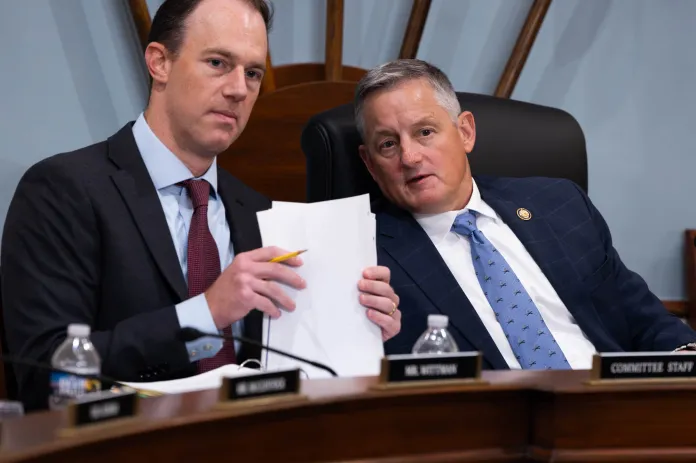


House Republicans are using clean energy to appeal to their Democratic colleagues as they mount an uphill battle to get bipartisan permitting reform passed before the end of the year.
The House Natural Resources Committee began a debate on revamping the environmental review process during a lengthy hearing on Wednesday, which lasted nearly five hours and featured two separate panels of industry experts.
Recommended Stories
- Interior moves to withdraw Biden public land rule that prioritized conservation
- Wright tells EU that sanctions hinge on ending purchases of Russian oil and gas
- States and wind farm venture sue Trump administration over contract cancellations
The hearing focused on three bipartisan pieces of legislation aimed at accelerating the permitting process for infrastructure and energy projects, including one introduced by committee Chairman Bruce Westerman (R-AR).
Westerman’s bill would overhaul the 55-year-old National Environmental Policy Act, which requires federal agencies to evaluate the environmental effects of major actions and decisions relevant to their departments.

Previously proposed reforms to the bedrock environmental law have become a point of contention for Democrats, who argue that the law is crucial to avoiding the endangerment of public lands and wildlife and curbing climate change. However, Republicans insist that NEPA has done more harm than good by acting as bureaucratic red tape, allowing projects to undergo yearslong legal delays, and slowing infrastructure development.
Permitting reform is a priority for Republicans and Democrats, as lawmakers on both sides of the aisle seek to advance natural gas projects, clean energy projects, and traditional infrastructure advancements in their states.
Republicans hold the majority in the House and Senate, but legislation advanced to the upper chamber must obtain 60 votes to pass. Without bipartisan support, any proposed measure is doomed to fail.
While accelerating the environmental review process is important to both parties, they have failed in recent years to come to an agreement.
In the last Congress, permitting reform talks fell apart in December after lawmakers failed to agree on provisions related to NEPA. At the time, Democrats accused Republicans of attempting to gut the law and limit public feedback.
A little less than one year later, NEPA reform is back on the table, and Republicans are determined to bring as many Democrats on board as they can.
Westerman’s legislation is currently co-sponsored by Rep. Jared Golden (D-ME). Last month, the chairman told the Washington Examiner that he anticipated more would sign onto the bill and a larger permitting legislative bill in the coming weeks and months.
A new tactic Republicans are using to appeal to their colleagues across the aisle is highlighting how the proposed reforms will support and benefit clean energy products, particularly those waiting to connect to the grid.
Breaking from the Trump administration, which has sought to stymie renewable energy growth, Republican lawmakers emphasized during Wednesday’s hearing that the proposed legislation is “tech-neutral,” meaning it would not propose accelerated reviews for one energy source over another.
“I’m not sure how folks who support renewable energy could be opposed to smart NEPA reforms,” Rep. Nick Begich (R-AK) said.
Begich noted that reforms proposed would allow the United States to increase its critical mineral mining capabilities and shore up much of the supply chain for renewable energy projects, which is dominated by China.
“We must allow our nation to grow and develop. Revisions to NEPA are smart and they are necessary for core infrastructure investments to proceed at the speed of our modern competitive reality,” Begich said.
Rep. Pete Stauber (R-MN) also attempted to send that message in his questioning of the permitting reform advocates providing their testimony during the hearing. Stauber specifically focused on the permitting reform bill written by Westerman and Golden, known as the Standardizing Permitting and Expediting Economic Development Act.
“Would reforms in the SPEED Act benefit all kinds of projects, including renewable energy projects, and the build-up of transmission lines?” Stauber asked Thomas Hochman, director of infrastructure policy for the Foundation for American Innovation.
“Absolutely,” Hochman responded. “This is tech-neutral permitting reform.”
Some Democrats, including Rep. Scott Peters (D-CA), have already met in the middle on other pieces of legislation focused on streamlining the permitting process, and more appear almost ready to offer their support.
During Wednesday’s hearing, Reps. Seth Magaziner (D-RI) and Sarah Elfreth (D-MD) said they want to get to “yes” on a permitting reform legislation, but stopped short of saying they would back the bills in their current form.
Many appear hesitant to reach an agreement due to the Trump administration’s continued crackdown on clean energy projects.
KEY HOUSE REPUBLICAN AIMS TO GET PERMITTING REFORM TO SENATE BY YEAR’S END
“We cannot ignore the broader context here, that if my colleagues across the aisle … are advocating for all-of-the-above energy strategy, you can’t say you’re for that and pass it through Congress, when we know that the Trump administration is going to block the clean energy part of all the above, and so that’s something that we’re going to have to deal with,” Magaziner said.
Westerman did express openness to modifying parts of his bill on Wednesday, noting that he wants to make the legislation work. However, he is unlikely to advance any legislation without changes made to NEPA, as detailed in the draft bill.
